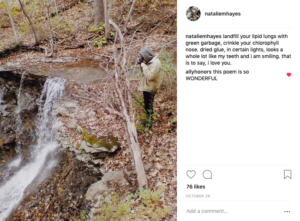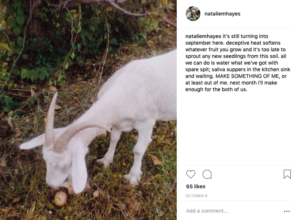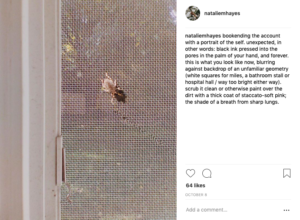My blog post this week feels a little bit like a cop-out, but also kind of relevant given Lytton recently brought up “Instagram poetry” in class.
As I’ve talked about before, I recently switched to a flip phone as a sort of reclamation of the time that was being lost to mindlessly scrolling on my smartphone, and also as a general initiative to be more present. Pre-flip phone, most of my mindless scrolling was spent on Instagram, a space which is, perhaps more than any other online, dependent on a fabricated image of the self. Despite this, I liked the sensory stimulation that was looking at dumb shit on my explore page, and so I spent a lot of time there. Consequentially, soon after abandoning my smartphone, I realized I kind of missed social media and, specifically, Instagram. So I got back on. I still use a flip phone but, on occasion, I throw up a post on Instagram (either via an old tablet I have or via a friend’s borrowed phone). The thing is, I wanted to reengage with Instagram in a more meaningful way than I had previously; it would feel disingenuous, I think, to use a flip phone while simultaneously succumbing fully to the self-centeredness of social media. How could I possibly make myself more present if I’m so caught up in what’s not real?
So, I decided to dedicate the space of captions to poetry. This makes the act of posting, for me at least, really meaningful and thoughtful; I feel a lot less like I’m wasting my time if I have to sit down and really think about what I’m going to write. As I said in a past blog post regarding my flip phone, this action has got me paying much more attention to the weight of words, down to each individual letter. But yeah, now all of my Instagram posts are either photographs taken by friends of photographs that I’ve taken on my flip phone, all captioned with little poems or snippets of poems. The biggest downside of all of this, although it is really fun, is the fact that Instagram’s interface is not at all compatible with lineation. Either way, my profile is private, so I’m going to attach a few screenshots below, but also I guess follow me if you want!



